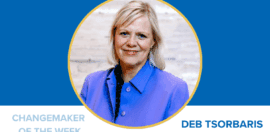Victoria's advocate for disability workers rights

10 November 2023 at 9:00 am
Dan Stubbs is the Victorian Disability Worker Commissioner and is the head of the Commission. He was appointed in October 2019 by the Governor-in-Council, on the recommendation of the Minister and in consultation with the Disability Worker Registration Board of Victoria, and is responsible for regulating the conduct of disability workers.
As well as regulating unregistered workers, the Victorian Disability Worker Commissioner responds to complaints about all disability workers and has the power to ban unregistered workers from the sector for breaching a Code of Conduct. Dan has a disability; he has a sight impairment. Dan’s lived experience of disability and his experience working alongside people with disability means he has some understanding of the reliance people have on disability workers and the need to ensure services are safe and of the highest quality. Read on to learn more about Dan in this weeks change maker profile!
Describe your career trajectory and how you got to your current position.
It’s been quite a zig-zagging career that’s got me here. Although when I look back, I feel like all the variety of things I’ve done are exactly what I needed to do to then become Victoria’s Disability Worker Commissioner.
Previously I was in the Community legal sector where I had the privilege of supporting and representing a wide range of vulnerable people. I was CEO at Inner Melbourne Community Legal in North Melbourne and before that I was the Director (as well as practicing lawyer at Inner City Legal Centre in Kings Cross, Sydney. There’s never a dull moment in community law and certainly extremely interesting and challenging running a legal centre in Kings Cross.
Before community law I had the amazing experience of working on a range of disability and human rights projects in pacific island countries, such as Fiji, PNG, Samoa and Vanuatu. There was really nothing like working with people with disability in completely different cultures in developing countries to learn about how disability can be accepted so differently, how rights are understood, our often misguided understanding of ‘development’ and my own privilege. I think I most loved working with Pacific islanders with disability for how accepting and welcoming they are as well as how resourceful and adaptable I found them.
Before living in Fiji I was in Canberra heading up the ACT Council Of Social Service (ACTCOSS). In that role I got to be part of the introduction of Australia’s first Bill of rights. The Act is a fascinating place to advocate for social justice. I learned that, although there are a lot of people doing quite well there, those who aren’t are so much more disadvantaged due to that disparity. In this role I had to advocate to both Liberal and Labor governments and learned a lot about how to bring social justice issues to the top of the agenda depending on someone’s politics.
Throughout my adult life I have always been involved in disability advocacy organisations, either on boards or in different voluntary roles. So no matter what my paid work has been I’ve been able to pursue my passion of advocating for the rights and entitlements of people with disability. And my current role was the obvious next step for me where I have the privilege of working for the most isolated, vulnerable people with disability who rely on support workers to participate in any way.
What does this role mean to you?
This is the most important work I’ve ever done. I don’t treat lightly the responsibility of stopping abuse and neglect of people with disability and raising the quality of disability services.
Defending some of the most basic rights of people with disability (eg safety, choice, self-determination) is profoundly important and so fundamental. These basic human rights can often be forgotten when many of us focus on other rights like anti-discrimination. I feel that if I can be part of ensuring that the quality of disability services develops so that all workers provide and support greater participation for people with disability, then I’ll have also made life safer and more enjoyable for people. I’ll also have made our community a better place as I passionately believe that a more diverse and inclusive society is stronger and better for all of us, disabled and non-disabled.
I must of course declare my interest. I am a person with disability. I have mostly been the beneficiary of inclusive services throughout my life, although when I lost my sight at 14, I worried I was going to be sent to a specialist school – I would later learn that this was also the expectation of the school administration as they felt there was no way they could teach a blind boy. Thankfully some teachers had quite different ideas and I became the first child with disability at that high school. This is part of the reason why I feel strongly that disability services are at their best when finding ways to provide for inclusion and participation.
Take us through a typical day of work for you.
These days I tend to go into work in the office most days. Perhaps due to my sight impairment, or my personal need for connection, or the flexibility my partner allows me. I go in a lot because I get so little from meeting with people online. Also, I often reflect on the fact that disability support workers never got the option of working from home, so if I’m going to demand better from them I should show up with enthusiasm like I expect them to.
Often I start the day pouring over the current regulatory decision. This is usually a decision to prohibit a disability worker from working with people with disabilities anywhere in Victoria due to some awful conduct. Sometimes it’s a decision to commence an investigation into a worker’s conduct or a regulatory outcome. It’s the key part of my role, many of the decisions can’t be delegated and so I figure it’s crucial to consider these decision early in the day before the schedules crowded out with so many other things.
More and more I am getting the opportunity to speak and listen to groups from across the disability community, people with disability, families, workers, advocates and service provider agencies. This is generally incredibly energising and thought provoking. These engagement opportunities will often both remind me why I do this job and provide new ideas of ways we can do this differently and better.
Particularly if I’m in the office I’ll touch base with my Commission colleagues if I can. Often I’ll meet with those involved in regulatory actions, eg receiving complaints, investigation, worker registration. I’ll also spend time working with my colleagues involved in policy, communications and sector engagement. Engaging with the sector we regulate is an important way to ensure that what we’re doing makes a difference. And engaging with those for whom we regulate is crucial to ensuring we are getting to the most vulnerable and isolated people with disability.
What is the biggest challenge you’ve encountered in your career, and how did you overcome it?
Like most people with disability, after I finished university, I ended up unemployed for a year. I wrote many hundreds of applications, reached out and built networks, and worked as a volunteer. And at the same time I questioned everything about myself and my capabilities.
In retrospect, I overcame this through a mixture of luck and perseverance. Once I broadened my job search, One of my many job applications eventually landed me in the Australian Public Service in Canberra.
If you could go back in time, what piece of advice would you give yourself as you first embarked on your career?
I probably have three pieces of advice for my younger self. (1) Don’t stay in the jobs you’re not good at, which is usually the job you’re really not enjoying. (2) Trust your judgement. (3) Don’t worry, it’s going to be OK – even when things feel overwhelmingly risky or bleak.
How do you unwind after work?
We have a big, adorable and affectionate Great Dane named Moby. If I’m working from home he’ll come and start nudging me at around 4:30pm. If I’m still working in 6:30 or 7pm he’ll be ready to haul me bodily to the front door to take me on our walk. And if I’ve been at the office, there’s nothing like the excitement of 60 kilos of dog to welcome me home and to enjoy 30mins of walking, listening and sniffing around the neighbourhood with. (To be clear, he does the sniffing and I do the listening.)
What was the last thing you watched, read or listened to?
There’s a series of books called the Ranger’s Apprentice. I’m reading these audio books whilst my 13 year old step son is reading them. It’s some glorious escapism into an ancient world of knights, castles, honour and thoughtful characters. But what I truly love is being in the worlds most exclusive book club and having another way to connect with one of the two dear young men in my life.







